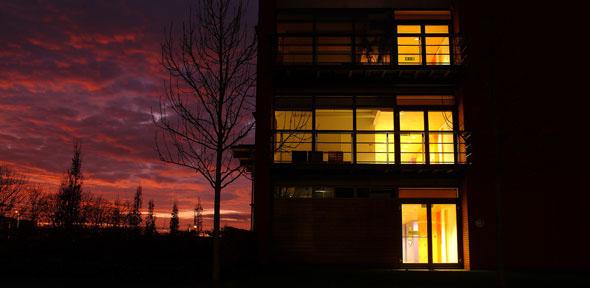
Staff and students turned off lights and computers, £5,000 worth of electricity was saved and a Pro-Vice-Chancellor circumnavigated the world 28 times.
If a reduction of 2.1 per cent were maintained throughout a calendar year, a total of £244,137 would be saved and 1,420 fewer tonnes of carbon dioxide would be released into the atmosphere.
The University’s inaugural Switch Off Week resulted in an overall drop in relative electricity use of 2.1 per cent thanks to efforts by staff and students to turn off equipment and lights.
This figure reflects electricity saved in comparison with the week before, and has been adjusted to account for the weather.
Staff and students across many departments were inspired by a visible ‘Cambridge Green Challenge’ campaign to turn off lights, computers and other equipment, saving the equivalent of £5,000, or 50,484 kilowatt hours (kWh) by the end of the week. An impressive mid-week drop saw a 4.1 per cent reduction in consumption by Wednesday without any ‘degree day’ correction for weather conditions, equal to 45,310 kWh.
The week’s total savings were used to power Pro-Vice-Chancellor for Institutional Affairs Jeremy Sanders on a virtual bike ride around the world – savings by midnight on Wednesday had propelled him 28 times around the globe. Snapshots of Professor Sanders’ various adventures can be seen on the Switch Off Week website.
Impressive early-week reductions were followed by an end-of-week slump. Numb toes meant the temptation to turn on electric heaters was too great, and the University’s savings reduced over the week. The cold weather towards the end of the week also meant an increase in electricity use by several of the University’s buildings that have controlled air temperatures and humidity levels. Unfortunately this is not something that conscientious switching-off can prevent.
On the other hand, some buildings saw excellent savings over the week, with a 7 per cent reduction at the Old Schools, a 13 per cent saving by the Careers Service in Stuart House, and a 20 per cent saving by Estate Management’s Kenmare House.
Such figures give an indication of how small changes in behaviour can lead to significant cuts in usage. If a reduction of 2.1 per cent were maintained throughout a calendar year, a total of £244,137 would be saved and 1,420 fewer tonnes of carbon dioxide would be released into the atmosphere.
Energy savings are also good news for departmental budgets. The Energy Incentivisation Scheme means departments now have an allocated budget according to their energy needs: whatever they save can be used as they wish; whatever they spend over their budget they must pay for. Savings made by departments during Switch Off Week, and continued savings throughout the year, will be fed back into their budgets.
In addition to this, the Energy and Carbon Reduction Project will now donate £5,000 towards an energy saving idea to be chosen by a University-wide vote.
